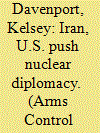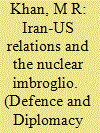| Srl | Item |
| 1 |
ID:
114341


|
|
|
|
|
| Publication |
2012.
|
| Summary/Abstract |
The India-Afghanistan relationship is not a simple bilateral engagement. India's Afghan policy is driven by, and is dependent on, many extraneous factors such as India's troubled relationship with Pakistan, its search for a land transit to Central Asia through Iran and Afghanistan and its concerns regarding use of Afghan territory by Pakistan to the detriment of Indian interests. Given the geographical constraints, India has relied on Iran for land access to Afghanistan. This has been complicated by Iran-US relations -the two countries with whom India shares common interests. India has also tried to address Pakistani apprehensions regarding its engagement in Afghanistan. Its decision to resume bilateral dialogue in spite of domestic pressures against any such initiative post-Mumbai and the inclusion of Balochistan in the joint statement issued at Sharm-al-Sheikh in 2009 are part of New Delhi's policy to build confidence with Islamabad. Simultaneously, India has gained enormous political capital through its economic engagement with other countries of the region. This is likely to help it to sustain its presence in Afghanistan after 2014, when the Taliban may well be a part of the government in Kabul.
|
|
|
|
|
|
|
|
|
|
|
|
|
|
|
|
| 2 |
ID:
128081


|
|
|
|
|
| Publication |
2013.
|
| Summary/Abstract |
Following a high-level series of diplomatic exchanges and meetings between U.S. and Iranian leaders in late September, both sides say there is a strong basis for a diplomatic resolution to the long-running impasse over Iran's nuclear program. In the highest level of contact between the two governments since 1979, President Barack Obama and Iranian President Hassan Rouhani spoke by telephone about Iran's nuclear program Sept. 27, Obama told reporters at a White House news conference later that day. "While there will surely be important obstacles" and success is not guaranteed, "I believe we can reach a comprehensive solution" to the dispute over Tehran's nuclear program, Obama said.
|
|
|
|
|
|
|
|
|
|
|
|
|
|
|
|
| 3 |
ID:
114626


|
|
|
|
|
| Publication |
2012.
|
| Summary/Abstract |
Prior to World War II, the US involvement with the Persian Gulf
was minimal as it was regarded as a British preserve. However,
during the war, a US Middle East Command was created to oversee
the supply route of war material to the Soviet Union through Iran
and it consisted of some 30,000 personnel. But after the war, it was
reduced to a small contingent stationed at Jufair and Bahrain under
an arrangement with the British. The task of containment of the
Soviets in the huge arc from the Suez to the Malacas was also left to
the British. When the UK decided to withdraw from the region in
1968 due to financial constrains, Washington was in no position to
fill the so-called vacuum due to its heavy commitments elsewhere,
especially in Vietnam.
|
|
|
|
|
|
|
|
|
|
|
|
|
|
|
|